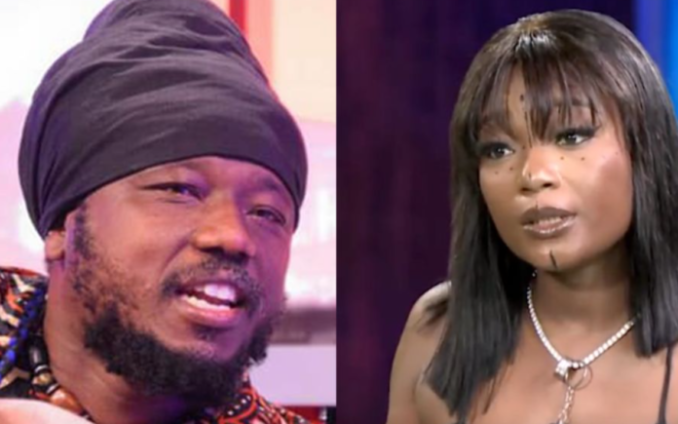Controversial radio presenter Blakk Rasta, has credited musician Efya for making his songs popular.
In an interview with Andy Dosty on Daybreak Hitz, on Thursday, Blakk Rasta stated that even though his songs are popular outside the country, people didn’t know them here..
According to him, Efya did him a favour by describing him as a musician who does “funny songs.”
“In hindsight, it rather helped. It got people to get unto my music and know how deep my lyrics are” he stated.
Blakk Rasta added that “People went to go check out my music to laugh at me, but rather people got to realize my music and lyrics are not a joke.”
Blakk Rasta, throughout his journey in the music industry, has been able to put out eleven albums.
He however bemoaned the lack of recognition from his countrymen.
He likened his situation to that of legendary Ghanaian reggae icon, Rocky Dawuni who faces the same problem with his music career.
“I have released over eleven albums and recognized in other countries and not in my own country, just like Rocky Dawuni. Recognition is there but it’s very little, it could be more, and it could be better.
“All of a sudden, everyone is listening to Blakk Rasta’s music. ‘Serwaa Akoto’ has been played numerous times it’s now people are listening to ‘Serwaa Akoto’. “If they are to listen to Agyanka Ba they would weep.”
Black Rasta has over the past month been one of the most talked about celebrities in the country.
He came under heavy criticism after his response to multiple-award-winning singer Efya who called him a funny musician.
He called her a drug addict and advised her to seek help from specialists.
Blakk Rasta does "Kuchoko," which is predominantly reggae music fused with African rhythms and energies pouring out conscious lyrics about love, equal rights and justice, blackness, Rasta, and spiritual love.
Blakk Rasta's current "Kuchoko" sound innovation came about after a long period of research into a new sound, which will ride on reggae music and establish a sound that will cut across indigenous African sights, sounds, and spirituality and be accepted worldwide in these fast-changing times of musical tastes and preferences.
He uses indigenous African instruments such as the xylophone, talking drum (Dondo), Kette, Flute, Kologo, and Kora-fused with animal and jungle sounds and sounds from local markets.
Latest Stories
-
EPA says lead-based paints are dangerous to health, calls for safer alternatives
44 minutes -
Queenmother calls on President-elect Mahama to appoint more women in his government
3 hours -
Atletico Madrid beat Barcelona to go top of La Liga
3 hours -
Usyk breaks Fury’s heart with points win in rematch
3 hours -
Ghana-Russia Centre to run Russian language courses in Ghana
9 hours -
The Hidden Costs of Hunger: How food insecurity undermines mental and physical health in the U.S.
9 hours -
18plus4NDC marks 3rd anniversary with victory celebration in Accra
12 hours -
CREMA workshop highlights collaborative efforts to sustain Akata Lagoon
12 hours -
2024/25 Ghana League: Heart of Lions remain top with win over Basake Holy Stars
13 hours -
Black Queens: Nora Hauptle shares cryptic WAFCON preparation message amid future uncertainty
13 hours -
Re-declaration of parliamentary results affront to our democracy – Joyce Bawah
14 hours -
GPL 2024/25: Vision FC score late to deny Young Apostles third home win
14 hours -
Enhancing community initiatives for coastal resilience: Insights from Keta Lagoon Complex Ramsar Site Workshop
14 hours -
Family Health University College earns a Presidential Charter
14 hours -
GPL 2024/25: Bibiani GoldStars beat Nsoatreman to keep title race alive
14 hours

